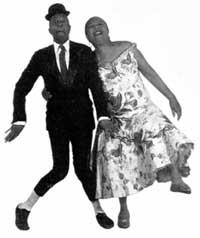
Good Morning POU!
This week’s open threads will feature some Nasty Women while the afternoon thread will feature some Bad Hombres! Shout out to TyrenM for the suggestion! LOL
Today however is a twofer, as this is a Nasty Woman & Bad Hombre duo!
Butterbeans & Susie

Butterbeans and Susie were an African American comedy duo comprising Jodie Edwards (July 19, 1893 – October 28, 1967) and Susie Edwards (née Susie Hawthorne; December 1894 – December 5, 1963). They married in 1917, and performed together until the early 1960s. Their act, a combination of marital quarrels, comic dances, and racy singing, proved popular on the Theatre Owners Booking Association (TOBA) tour.
Butterbeans and Susie spent decades performing on the circuit known as T.O.B.A. In a deeply segregated era, it was the top booking agency for black performers. A contract with the “Toby” circuit meant steady work. But, performers called it “doing Tobytime” because living conditions were so rough, and complained that T.O.B.A. stood for “Tough on Black Asses.” They later moved to vaudeville and appeared for a time with the blackface minstrel troupe the Rabbit’s Foot Company.
Butterbeans and Susie’s act played up the differences between the two. Susie wore elegant dresses and presented an air of composure and sexiness. Butterbeans, in contrast, played the fool, with his too-small pants and bowler hat, bow tie, tails, and floppy shoes. He was loudly belligerent; however, his pugnaciousness was belied by a happy demeanor and an inability to resist Susie’s charms. The black comedian Godfrey Cambridge said, “Butterbeans and Susie originated the routine…that later was translated into George Burns and Gracie Allen.”

Butterbeans and Susie emphasized comedy with content that was frowned on by moralists. The typical act featured a duet, a blues song by Susie, a cakewalk dance, and a comedy sketch. Short bouts of bickering peppered the act. The humor often concerned marriage or occasionally black life in general. One of their more popular numbers was “A Married Man’s a Fool If He Thinks His Wife Don’t Love Nobody but Him”. The act was risqué at times. One of their more popular comic songs was Susie’s saucy “I Want a Hot Dog for My Roll”, full of racy double entendres:
- I want a hot dog without bread you see.
- ‘Cause I carry my bread with me.
- . . .
- I want it hot, I don’t want it cold.
- I want it so it fit my roll.
The song was accompanied by Susie’s provocative dancing and Buttberbeans’s call-and-response one-liners: “My dog’s never cold!” “Here’s a dog that’s long and lean.” “I Want a Hot Dog for My Roll” was one of the few songs that Okeh refused to release.
The act usually ended with a song by Susie that showed that the two really were happily married, followed Butterbeans’s trademark song-and-dance number, “The Heebie Jeebies” or “The Itch”. During this dance, Butterbeans thrust his hands in his pockets and began to scratch himself in time with the music. As the tempo increased, he pulled the hands back out and scratched the rest of his body. According to Stearns, this was the moment when the audience “flipped”.
Butterbeans and Susie made several recordings of blues songs interspersed with comic banter for Okeh Records between 1924 and 1930.
In 1926, they made a recording with Louis Armstrong‘s Hot Five, a mildly salacious blues number called “He Likes It Slow”.
I’ve got the sweetest man, you know
I’m crazy ’bout him, but he’s so slow
And when he takes me out to have a dog
Frankly, he just makes me walk
What I’m telling you is true
Everything that he goes to do
Ah!
He likes it slow when he goes to play
He likes it slow when he goes to pray
Just like that man
That man of mine, says,
“I never like to hurry
I just take my time.”
When he calls he never brings no news
Always got them low down blues
But when he starts to makin’ love, aw, gee
And starts to hugging’ me so tenderly
The reason Papa makes a hit with me
Because he likes it slow
Early in the morning
Because he likes it slow
In 1960, they issued an album on King Records‘ Festival label (FRC-7000).
Butterbeans and Susie used their fame and influence to help younger black comedians. After seeing Moms Mabley in Dallas, for example, they helped her gain acceptance at better venues. Even after leaving show business, they remained friends with many black entertainers and put up down-on-their-luck comedians in their Chicago home. Stepin Fetchit stayed with them at points during the 1950s and 1960s.

